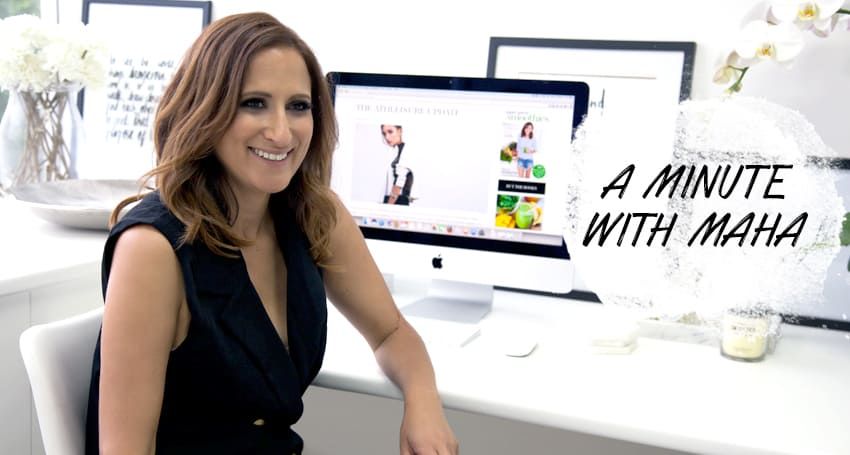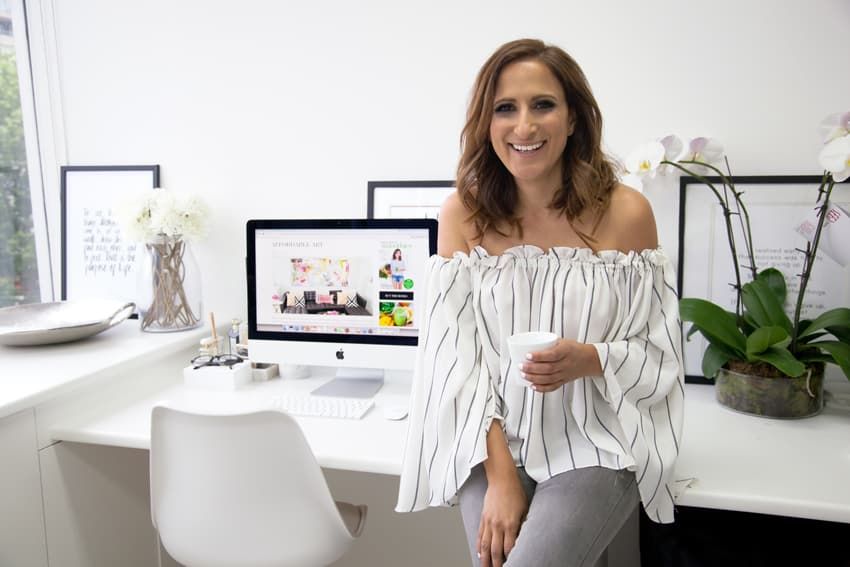
She’s the author of the bestselling books Super Green Smoothies and The Good Life, an accredited health coach and the co-founder of luxe for less website (you guessed it!) SWIISH.com. Going from working 9-5 (well, more like 9 – 9 … on a good day!) back when she was an HR executive, to now running a fashion, beauty and health focused website alongside her sister Sally Obermeder, it’s fair to say that Maha Koraiem knows what it takes to make a career leap.
Some of you have met Maha before at SWIISH events or when she’s been on the panel at a number of various conferences and events across the country. Some of you know her career background from magazine articles or reading Sal’s autobiography, Never Stop Believing. But one thing’s for sure, so many of you have asked Maha again and again – how did you make the decision to leave a successful career to start a business? How did you find the courage and the confidence? How do you balance work and life? What’s it like working with family? What do you wish you knew when you started your business?
Over the next few months, we’ll be spending a minute (or two!) with Maha, where she answers your questions relating to different business and entrepreneurial topics. Whether you’re a want-to-be entrepreneur, a serial go-getter or even if you’re just looking for a bit of inspiration, these interviews are designed for you. Maha is always happy to answer anything – whether it’s work related or even just her favourite ways to make fun of Sally (true!), so if there’s anything you want to know – leave a comment below or send us an email via hello@swiish.com.au and we’ll be sure to include it in upcoming posts.
This week, our interview will be focused on the topic of ‘starting a new career’, which is all about what it took for Maha to switch careers, begin a business and make the move from the corporate world into a lifestyle related industry.


It had been in the back of my mind for a while – I would say a few years – before I finally made the decision to go for it. I have always loved writing and I have always loved connecting with people. I knew I wanted to do a blog but it took me a long time to make the move, as I didn’t want to leave the safety and security of my corporate job. I studied psychology at uni and kind of fell into HR… I did enjoy it, and because I kept progressing into senior roles, I stayed in the industry for 15 years. When you’re getting a regular paycheck, and you have bills and commitments, you can always think of a thousand reasons not to take the risk and leave. But I knew deep down, a long term corporate career wasn’t for me, because as much as I enjoyed my job, I wanted to do something that I found more fulfilling and that gave me the flexibility I craved, for example to spend time with family, to never have to ask someone else if I could take a week off, or to work from home.
In a way, Sally’s cancer battle was a huge wake up call for me to pursue my dream and not stagnate in a career I didn’t see myself in longer term. It’s that whole realisation that life is so precious and so short, and you don’t want to wonder ‘what if’. But SWIISH was Sal’s idea – I still remember when she called me from the hospital right after one of her many surgeries and said she had this great idea. We were both passionate about living a ‘luxe for less’ lifestyle. She wanted to share all the tips and tricks to affordable style and I really wanted to write. At the time, I told her that she just needed to focus on her recovery from cancer first. But in the back of my mind I knew it was an incredible idea and for the first time ever, I felt like I was ready to make it happen.
![]()
Obviously, there are a tonne of factors you need to consider before leaving your current career. Firstly, you really have to know why you’re doing it. If you feel like it might just be because you hate your boss or you don’t get a whole lot of perks, then maybe a lateral move to another area in the company or a whole new organisation would be better. However, if you know deep down that you’re not in the right industry, that you have a passion that’s being unfulfilled or you have an idea that needs to be brought to life, then maybe shifting careers or becoming an entrepreneur is the right move for you.
For me, I had to be willing to make sacrifices. I still had bills to pay, so I needed to do the maths first to work out how I could survive financially on an ongoing basis. That meant cutting down on a lot of ‘nice to haves’ like regular takeaway or brunches with the girls on the weekend. In many circumstances (especially if you’re starting your own business) you need to accept having a lower income – or even no income for a period of time, less social time and longer working hours while your business is in its beginning stages. Hey, SWIISH is about to go into its 5th year and we still don’t get enough sleep. Ha ha! The key is to remember why you’re doing it and to stay motivated.

The first step is definitely to do your research. Look at other people who are doing what you want to do and try to learn from them. You’ll also want to research the market you’re going into and who your competitors are. Has your idea/product/service already been done? How could yours be better? What is the problem or need that you’re trying to solve with your business idea?
When Sal and I decided to start SWIISH, we were constantly looking to learn from other entrepreneurs who had set their businesses up for success. We had our idea and at the time, there weren’t really any blogs which focussed on luxe for less across the whole lifestyle spectrum – in other words, not just fashion and beauty but health and home and family too. We knew it could work because people were often asking us – ‘where did you buy that? it looks so expensive’ – we had a knack for finding the best, most affordable ways to look and feel good on a budget, because that’s how we actually live our own lives. So we took our passion and experience, identified that there was a gap and built on it to create our own, unique platform.
The next stage is then to plan. Think about the resources you’ll need, the audience you want to target, how you’re going to get the word out and establish goals, timelines and financial plans. It all sounds very time consuming (it is) but believe me, it’ll save you time and money in the long run!
I think you also have to know that you’ll be constantly learning, changing and adapting your business as you go along. You’ll have wins, you’ll have losses, there are no guarantees. So in some ways, it’s just good to start. Somewhere. Anywhere. Start and refine as you go along and gain more knowledge and experience. At SWIISH, we are always identifying new and better ways to run our business – I’m talking about things that there is no way we would have known about in the beginning. You’ll never have all the answers or the most efficient ways of doing things up front. So start and fail and learn and succeed and keep going. It’s part of the process.


The main risk is leaving a job that offers income and possible career progression. You also run the risk of leaving a job that you don’t really like, but don’t really hate either, only to find that the grass isn’t greener on the other side. Another major risk is to invest a substantial amount of money into an idea and end up losing some or all of it. I just know that for me, I asked myself – ‘what’s the worst thing that can happen if this doesn’t work out?’. And the answer was that I would have to go back and find another job in HR – I might have dropped a few rungs on the career ladder, or I might have to take a pay cut after having been out of the industry. To me, these things weren’t so bad. The benefits of changing careers have been far greater than the risks. I work on my own time, I have creative freedom, I have independence, I work with my sister / bestie and most importantly, I love what I do!
To me, it seems very easy to validate the ‘risk’ of losing money or time. You might lose X amount of dollars or waste X amount of time. But people tend to have a hard time considering risks associated with not making a change, such as dreading every minute of work, experiencing extreme anxiety every Monday morning or even becoming depressed. These are still risks, but we tend to consider them less important because they’re not quantifiable like money or time.
Although it’s important to consider the risks when leaving your current career, it’s also important to ask – what are the risks if I don’t?

Again, research and planning were essential and helped to us to avoid a lot of complications – get a good accountant, get your company structure set up properly, get insurance, get legal advice if you need to. In terms of my personal financial risk, I did some HR consulting on the side for the first couple of years while we started working on, and growing SWIISH. I’d work with a number of clients on HR issues at various times throughout the week, and then come home and work on SWIISH at night and on the weekend. If you’re willing to sacrifice your personal time, this is a great way to start getting your business together without going completely broke. As you start to gain a better financial footing, you can then consider whether you need to part ways with your other job.

I only get to choose one? Ha ha! There were plenty of challenges but I think the main one was finding the time to develop the business. It took a lot of work and a LOT of time to get the business up and running, which left little room for family time, social engagements and even just regular down time. We were flat out! We soon learnt to overcome this challenge by scheduling in specific times for these things, just like you would a meeting. It sounds ridiculous but it works! If we didn’t secure time for our family and friends, we’d never see them, which would leave us unhappy and worn out. Sal and I also made sure that we had time to catch up as sisters where talking about work was off limits. It helped us to maintain our close bond as family and besties first and foremost.


My first piece of advice would be to surround yourself with people who support you. There will be a lot of people who will tear your ideas down and most of the time, it’s only because they’re worried about you, or maybe even you’re doing what they wish they could.
Instead of focusing on the risks, try to focus on all the potential benefits. You may worry about having to work longer hours, getting a lower income or not having time to travel for a while but in the long run, doing what you love every day will be worth all the effort.
Also, don’t forget that everything you’ve done up until this point is still meaningful. A lot of people think “oh well I can’t do something new now, otherwise the last 20 years will be a waste!” I think this is so wrong. When we started SWIISH, I forced myself to write a bio, basically stating all the things that I had done in HR, which would still be useful in my new career as a business owner and blogger. Seeing it on paper gave me so much extra confidence and helped me to remember that in the time I spent working up until I made the change, I gained experience, established relationships and learnt hundreds of useful skills, all of which will help you on your next path.
You just need to back yourself and go for it.



